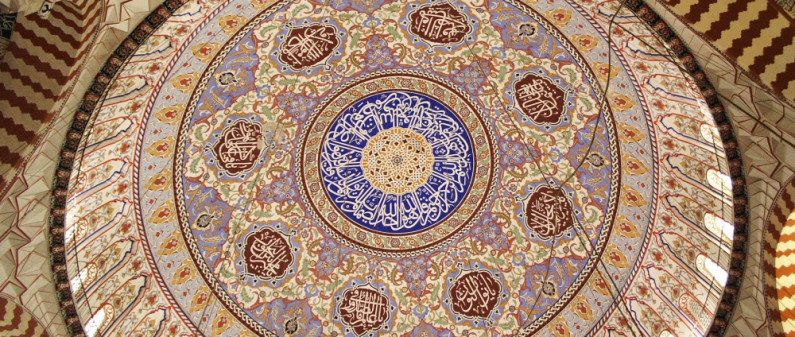
Heon C. Kim
Gülen regards dialogue as an activity of forming a bond between two or more parties. By ‘parties’ he does not mean any specific subjects, but instead includes all objects involved in humanity. To form a bond between parties means to Gülen to see human beings as the objects of dialogue. Thus, his concept of dialogue, rather than being a generic term, specifies the humanitarian approach to dialogue, which manifests itself with tolerance and various tolerance-based concepts such as love, compassion, forgiveness and humility. In this sense, tolerance and dialogue in his writings appear as a paired concept for humanity, as he considers them to be want he called the two roses of the emerald hills of humanity (Gülen 2004a: 50-53). This consideration is notably presented in his article on Sufism entitled ‘The Two Roses of the Emerald Hills: Tolerance and Dialogue’, which indicates Gülen’s approach to dialogue within the purview of Sufism.
In Gülen’s thinking, tolerance is indispensable to Sufism. Above all, he has signified the tolerant nature of Sufism by the three principles of Sufism, as “overflowing with Divine Love and getting along with all other beings in the realization (originating from Divine Love) that the universe is a cradle of brotherhood”, “giving preference or precedence to the well-being and happiness of others” and “being open to love, spiritual yearning, delight and ecstasy” (Gülen 1998a: xv-xvi). Further, Gülen directly related this quality of tolerance to love in describing the Sufi knowledge of God (marifa):
Knowledge of God does not consist of abstract knowledge; in its true form, it is transformed into love. We cannot remain indifferent to someone in whom we believed and then grew to know well. After belief and knowledge comes love. Love is the crown of belief in God and knowledge of Him. Love is open to everyone according to his or her level. Love, which seeks to deepen itself, always travels on the horizon of ‘increase’, asking: “Isn’t there more?” On the one hand, sacred knowledge increases, giving rise to increasing in love, which causes knowledge to increase still further. (Gülen, The Culture of the Heart in en.fgulen.com)
Tolerance, love and knowledge of God are inseparable in Gülen’s Sufism. In particular, Gülen is convinced that only by love can humanism be realized, and humanity is a sublimation of love. To him, humanity is the most valuable being in the universe as the greatest mirror of the Names, Attributes, and Deeds of God (Gülen 2006). Every human being is equally endowed with the capacity to mirror divine nature to be developed to be “greater than the universe” (Gülen 2004b: 292), thereby securing the equality of all humans, regardless of religion, race, wealth and social status. Foremost of the human reflections as a divine mirror is love. Gülen explained this as follows:
[L]ove is the rose in our belief, a realm of the heart that never withers. Above all else, just as God wove the universe like lace on the loom of love, the most magical and charming music in the bosom of existence is always love. The strongest relationship among individuals that forms family, society, and nation is love. Universal love shows itself throughout the cosmos in the fact that each particle helps and supports every other particle. This is true to such an extent that the most dominant factor in the spirit of existence is love. As an individual of the universal chorus, almost every creature acts and behaves in its own style, according to the magical tune it has received from God, in a melody of love. (Gülen 2004a: 50-51)
To Gülen, therefore, “love is the most essential element in every being” (Gülen 1998b: 59). As the most essential element, love is innate in the human heart and springs therefrom. The heart is “the polished mirror in which Divine knowledge is reflected” to an extent that it is “more valuable and honored than the Ka’ba” (Gülen 1998a: 24). In spite of this significance, Gülen warned, the heart can be “a means by which satanic and carnal temptations and vices can enter … [and] If it is commanded by the carnal (inherently evil) self, it can become a target for Satan’s poisonous arrows” (Gülen 1998a: 24). Therefore, the heart “must be protected and kept safe from infection” (Gülen 1998a: 24) by being continually polished and cleansed. In this regard, Gülen put an emphasis on the need for spiritual training and considered Sufism as a proven way to polish and cleanse the heart for its proper function of reflecting love.
This understanding of love in the purview of Sufism shaped Gülen’s tolerance-based humanism, and leads to his advocacy of dialogue as a pragmatic extension of humanism. In Gülen’s thought, dialogue is a ‘must’ for today’s world, (Turkish Daily News, 2001) and Sufism is a way to secure such a ‘must.’ I note this intrinsic relationship by proposing to call it ‘dialogic Sufism’.
Dialogic Sufism opposes a dialectical approach to humanity which assumes an opposing and conflicting relationship between self and others. As I have analysed elsewhere, (Kim, 2013) a dialectical approach has been dominant in the modern world especially in Friedrich Hegel’s dialectic philosophy of “ideologically inferior others”, Karl Marx’s materialistic worldview of “materially alienated others” and Samuel Huntington’s theory of the ‘Clash of Civilizations’ which assumes “religiously incompatible others”. Unlike this dialectical approach to humanity, dialogic Sufism as shown in Gülen’s thinking underlines an interdependent unit of ‘self and others’ and assumes self and others as the subject/object of dialogue. To this extent, dialogic Sufism does not follow the divisional history of many Sufi orders, which has shown divisions in society. Dialogic Sufism is also far from being political. It is unlike the so-called ‘political Islam’ which, as represented by the case of “Jihad by a sword” (Jihad bis-saif) of Sayyid Qutb (1990), tends to react to problems. Instead, it interacts with any challenging condition and context to build a dialogical bridge between the past and the present, the East and the West, rationalism/materialism and spiritualism, and between different civilizations, religions and cultures, obliterating difference and distinction between ‘self and others’.
As a foundation of dialogic Sufism, Gülen put forward the Turkish Sufi tradition. He considers the Turkish Sufi tradition as an inherited consciousness proceeded by “the collective act of saints” which, as a cultural reality, has long been accumulated and embedded through an internalizing and vitalizing process of a spirit of tolerance and love. Gülen affirmed that “Sufism has spread among the Turks in both Central Asia and Turkey. This is why Turkish Islam always has been broader, deeper, more tolerant and inclusive, and based on love” (Turgut 1997). He further asserted that:
The teaching of tasawwuf remains to certain extent in every corner of our society. Everyone took a benefit from it. The influence of tasawwuf on Turkish society is stronger and deeper than [in] any other Islamic country. A custom such as to see oneself as lower than others; to see others higher than oneself and to give priority to others over oneself was impregnated to this nation from its very beginning by Sufi authorities such as Ahmad Yasawi, Yunus Emre, Mevlana Celaleddin-i Rumi and Haci Bektash Veli … . That soft and inclusive worldview and attitude gain important place and value toward Allah, and become a unifying element of social life … . This understanding exists in almost all individuals in the Turkish nation. (Pope 1998)
Gülen’s appreciation of the soft, humble and inclusive Sufism initiated by Yasawi, Rumi, Emre and Bektash affirms its continuing existence as a cultural heritage of Turks.
Excerpt from:
Heon C. Kim. “Sufism and Dialogue in the Hizmet Movement” Hizmet Studies Review Vol. 2, No. 2, Spring 2015, Pages: 33-49
References:
Gülen, F. (1998a). The Emerald Hills of the Heart: Key Concepts in the Practice of Sufism 1 (Izmir: Kaynak).
—. (1998b). Hosgoru ve Diyalog Iklimi (Izmir: Merkur Yayinlari),
—. (2004a). Toward a Global Civilization of Love and Tolerance (New Jersey: Light).
—. (2004b). Emerald Hills of the Heart: Key Concepts in the Practice of Sufism 2 (New Jersey: Light).
—. (2006). ‘Respect for Humankind’, The Fountain, Issue 53.
Kim, H (2013). ‘Dialogic Humanism: Gülen’s Alternative to Dialectical Approach to Humanity’. In O.Z. Soltes & M.A. Johnson (eds), Preventing Violence and Achieving World Peace, NY: Peter Lang Publishing, 23-40.
Pope, N. (1998). ‘Interview with Gülen’. Fransız Le Monde Gazetesi, 28 April 1998.
Qutb. S. (1990). Milestones (Indianapolis: American Trust Publications).
The Turkish Daily News ,14 September 2001 Gülen: Interfaith Dialogue is a Must’ at http://fgulen.com/en/press/news/24638-gulen-interfaith-dialogue-is-a-must
Turgut. H. (1997). ‘Nurculuk’. Sabah, 23-31 January 1997.
Tags: Fethullah Gulen | Sufism |
Related Articles

The Spiritual Heart in the Thought of Fethullah Gulen
Gülen resembles earlier spiritual teachers in that he evaluates the human as a whole; he is concerned with human’s not only spiritual but also material well-being. This holds…

Gülen flatly rejects the totalizing ideology of Islamism
Gülen is well aware that generally speaking Islamism is a reactive and reactionary ideology that is formed by contemporary human and social needs rather than what actually religion…

Are we doing enough to save the environment?
From Gulen’s perspective; belief will lead to eternity. With belief, humans become an ocean while they are drops, they become whole while they are parts, they become a…
